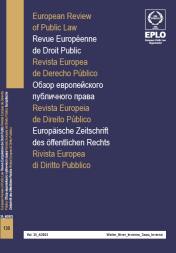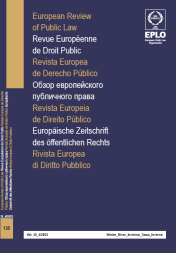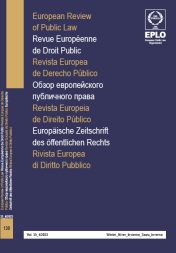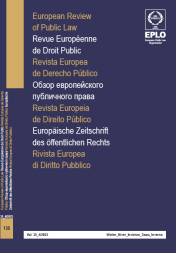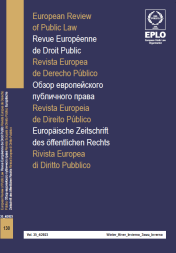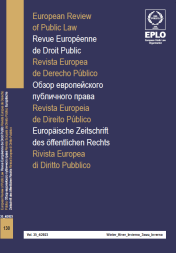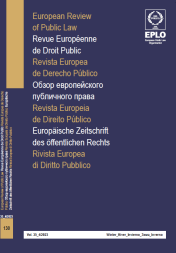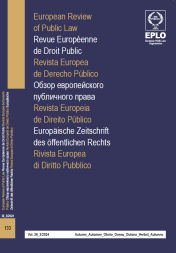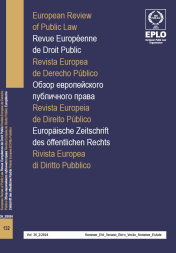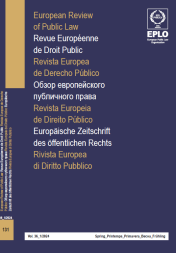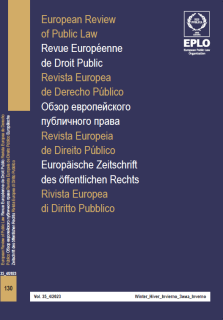
ERPL
Vol. 35, no 4, winter/hiver 2023 (130)
This ERPL issue features papers on topical matters covering legal issues of special interest and a plethora of jurisdictions, renewing the ERPL’s commitment to enriching the study of Public Law.
The issue starts by a paper that the ERPL is proud to publish, contributed by former State Senator of North Carolina, the Honorable Ms. Leslie J. Winner in the context of her speech on the occasion of the European Public Law Organization’s 2023 John Anastopoulos Lectures. The paper shares the lessons learned by the North Carolina Leadership Forum, a program of the Duke University, by bringing together deeply different cohorts of policy leaders for an intense dive into complex, thorny current issues; and the process over which they come to understand what is underneath their different perspectives, building the trust-based relationships they need to engage with each other constructively in the future.
The second article analyzes the first three decisions on hate speech by the newly established Facebook Oversight Board (OB), proving that OB attempts to develop uniform jurisprudence. It further observes that the OB is examining the cases under UN documents (e.g., in applying the freedom of speech test of the International Covenant on Civil and Political Rights and considering the Human Rights Committee’s guidelines), while pointing out that evolving jurisprudence also raises constitutionality concerns due to the possibility of a decreasing level of legal protection for online speech.
The third article deals with the constitutional rights or competences of the legal persons of the Church of Greece in principle, as well as the judicial protection of the rights of these religious legal entities. In the course of the research for this paper, it was ascertained that constitutional rights which derive from individual and collective religious freedom, develop both in the vertical church–state relation, with the rights being projected towards the state, as well as in the horizontal relation between the ecclesiastical legal persons when the church acts as state power, as such which by necessity acts, insofar as it is organized as a Public Law Legal Person. Many matters analyzed in this paper could also apply, mutatis mutandis, to ecclesiastical legal persons outside of Greece, based in other EU countries.
The final article in this section attempts to analyze the notion of Multilevel Governance of protected areas and present the holistic approach of the regulatory framework in Greece in light of the 2020 legislative reform which set up the system of Multilevel Governance of protected areas. Multilevel Governance is an indispensable tool for the achievement of sustainable development. It is an institutional policy-making system, based on the cooperation among various actors both from the public as well as the private sector. Since it constitutes a novelty for the country, the real challenge lies in the application of the system for the effective conservation of protected areas.
In the section of Chronicles of Constitutional Law, the first chronicle, coming from Greece, is spurred by the adoption of Law 5044/2023, the most recent legislative initiative that aims at facilitating out-of-country voting in national elections for Greek expatriates. It highlights the hesitancy exhibited by the political class in granting expatriates the right to vote for national elections from their place of residence, especially as the Greek state has ceaselessly shown a keen interest in maintaining and, when possible, forging its ties with the diaspora.
The chronicle on the Constitutional Law of Poland explores the difficult, complicated and multifaceted process in the country of repairing its democracy and return to the standards of the rule of law. The new Council of Ministers got to work right away, with the first results being a package of laws uunder way, the establishment of a dialogue with the European Commission and bringing Poland closer to full mobilization of funds from the National Recovery Plan. Certain aspects of this endeavor can be addressed through making changes to existing laws (e.g. recruitment of personnel in certain positions), some on the basis of laws (the NCJ, common courts, the Prosecutor’s Office) and some requiring amendments to the Constitution.
The second Constitutional Law chronicle analyzes the developments that have marked the legal landscape of the year 2023 in Romania – where legal regulation of the pensions regime, especially the service pensions, stand out. This is an intensely debated topic in recent years in Romania amid the economic developments, given the legal differences of the various categories of pensions regulated by the Romanian legislation. The Constitutional Court of Romania has played an essential role in defining legislative solutions by issuing decisions in numerous referrals of uncostitutionality regarding pensions regulations, an issue that has divided society. This context requires a careful balance of legislative solutions and viable strategies for the future, taking into account the State’s obligations and available resources.
The fourth Constitutional Law chronicle, coming from Spain, analyzes the constitutional legislation, as well as the main pronouncements of the Constitutional Court in 2022, which was the year of recovery from the COVID-19 pandemic. Law 15/2022, of 12 July, comprehensive for equal treatment and non-discrimination, and Law 19/2022, of 30 September, for the recognition of legal personality for the Mar Menor lagoon and its basin, are worth highlighting. With regard to the activity of the Constitutional Court, it is worth highlighting STC 70/2022, of 4 July, which declared unconstitutional one of the modifications introduced in ordinary health legislation to combat the COVID-19 pandemic, specifically the attribution to the contentious-administrative chambers of the High Courts of Justice of the competence for the denial or ratification of health measures for the protection of public health with unidentified addressees.
The first paper in the section of Chronicles of Administrative Law, coming from Germany, examines cases again relating to the COVID-19 pandemic that have been rendered by the Federal Administrative Court in 2023. The fields of construction and planning as well as environmental law were another key aspect of judicial rulings. The sheer volume of cases concerning immigration law furthermore represents the relevancy that asylum still holds in today’s world. In addition, clarifications have been made in specific subject areas like waste legislation and tax law.
In Finland, wherefrom the second Administrative Law chronicle comes, parliamentary elections were held in the spring 2023 and a new government was appointed in June, which affected the legislative drafting work. The new Finnish welfare service counties started operating as of the beginning of 2023, resulting in the enactment of new legislation regarding, for example, client data in healthcare and social welfare. In general, issues related to publicity legislation and its application have been problematic. The Supreme Administrative Court published several yearbook decisions on the unreasonableness of the granting of an extended residence permit. Finally, it is pointed out that amendments to the Act on the Sámi Parliament are still pending.
The chronicle on the Administrative Law of Greece outlines the development of administrative law during 2022 through important court decisions and significant laws. Law 4938/2022 which introduced the new institution of the telematic court and Law 4978/2022, by which the Public Revenue Collection Code was ratified by the Parliament, are examined. Furthermore, two important decisions are analyzed. First, the Council of State decision (A΄) 1500/2022 comes to be added to the “field” of those decisions of the Council of State which are distinguished by their consistent adherence to the letter and spirit of the provisions of the Constitution and its corresponding implementing legislation. The second one is the Council of State decision 625/2022 [A΄625-2022-3], the main contribution of which lies in the interpretation of Article 142 of the Administrative Procedure Code on no need to adjudicate in substantive disputes in the light of the right to judicial protection and the supra-legislative nature of its foundations.
The next chronicle, on Hungarian Administrative Law, maintains that, although the laws enacted by Parliament have changed certain provisions of the Code of General Administrative Procedure and the Code of Administrative Court Procedure in certain areas, they are not comparable in importance with the earlier amendments. In addition to this, an interesting amendment is analyzed concerning the start and deadline of administrative procedures in public authority procedures, and a minor terminological revision of the CACP due to the related constitutional amendment. The case-law also includes a case on sanctions in competition law, a case on exceeding the time limit for filing a case and a court judgment interpreting the subject of admissibility in the Curia in general.
The fifth Administrative Law chronicle presents selected events from the sphere of Polish administrative law that took place in 2022. In the sphere of doctrine two events are presented: the 26th Congress of Departments of Administrative Law and Procedure in Poznań and the 13th Cracow-Wrocław Administrative Scholars Meeting in Kraków. In the sphere of jurisprudence, an important resolution of the Supreme Administrative Court of June 30, 2022, I OPS 1/22, regarding the understanding of legal interest in administrative law, is presented. In the legislative sphere the chronicle pays attention to the main changes in Polish law related to Russia’s aggression against Ukraine in 2022.
Last but not least in the section of Administrative Law chronicles, the next chronicle tracks important developments in Spanish Administrative Law for the year 2023, influenced by the economic and social crisis derived from the conflicts in Ukraine and, more recently, the war trangedy in Gaza, the persistent drought which has particularly affected the Spanish agricultural sector, and the political polarization resulting from the general and regional elections, held barely two months apart. Some outstanding laws have been selected and commented on in this chronicle: (a) Organic Law 2/2023, of March 22, on the University System, which modernizes and internationalizes the Spanish university system, adapting it to the new social and technological needs; (b) Ordinary Law 7/2023, of March 28, on the protection of the rights and welfare of animals, which, together with Organic Law 3/2023, and the amendment of the Criminal Code, has become one of the most ambitious legislations in this area at the European level; and lastly, (c) Ordinary Law 2/2023, of February 20, regulating the protection of persons who report regulatory infringements and the fight against corruption (also known as the “whistleblowing law”).
A book received by the EPLO Library is also presented in this ERPL issue, which is concluded by an Analytical Table of the contents of all four ERPL issues of the year 2023.
Summary
The John Anastopoulos Lecture
L. J. Winner, Constructive Engagement: Democracy’s Leaders Addressing Challenges Across Ideological Divides [IN ENGLISH] (18 pp.)
Articles
T. Pongó, The Development of Hate Speech Assessment in the Practice of the Oversight Board [IN ENGLISH] (22 pp.)
father Ireneos – Antonios Giakoumakis, Ecclesiastical Legal Persons and Legal Protection of Constitutional Rights [IN ENGLISH] (15 pp.)
V. Tzatzaki, The Quest for Multilevel Governance of Protected Areas in Greece [IN ENGLISH] (30 pp.)
Chronicles
I. Constitutional Law
A. I. Pottakis, Greece [IN ENGLISH] (16 pp.)
G. Kuca / A. Dębowska / E. Gudowska-Natanek, Poland [IN ENGLISH] (21 pp.)
M. Safta, Romania [IN ENGLISH] (21 pp.)
F. M. García Costa, Spain [IN SPANISH] (15 pp.)
II. Administrative Law
M. Brenner / Th. Lieb, Federal Republic of Germany [IN GERMAN] (34 pp.)
K. Kuusikko, Finland [IN ENGLISH] (18 pp.)
M.-E. Ioannou, Greece [IN ENGLISH] (24 pp.)
Cs. Molnár, Hungary [IN ENGLISH] (10 pp.)
J. Człowiekowska, Poland [IN FRENCH] (17 pp.)
L. F. Maeso Seco, Spain [IN SPANISH] (11 pp.)
Books Received [IN ENGLISH] (1 pp.)
Analytical Table (4 pp.)















